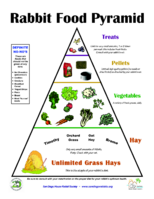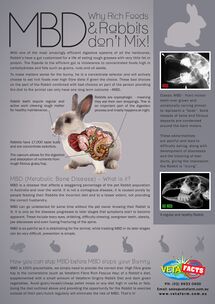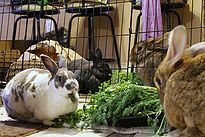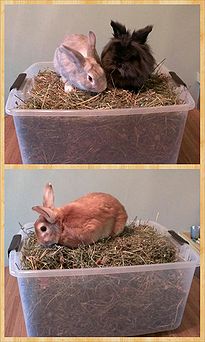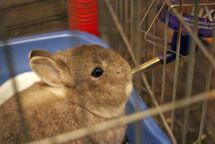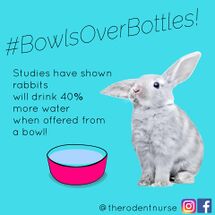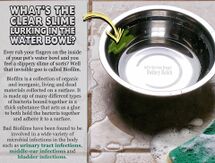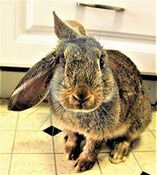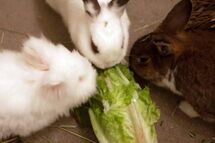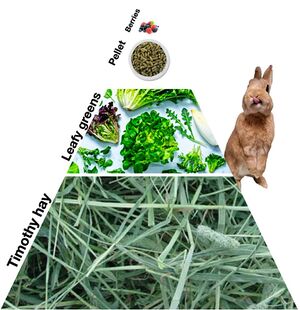Diet
A proper diet is extremely important to the health of a rabbit. Approximately 80% of a rabbit's diet should consist of hay or grass, then vegetables, pellets, and then rarely treats. While pellets can provide a complete source of nutrition when rationed, under no circumstances should you feed only vegetables and/or fruit to your rabbit as a diet. A hay-only diet is not appropriate either as rabbits receive very little nutrition because it passes so rapidly through the gut.[1]
| Body wt lbs | 2 | 3 | 4 | 5 | 6 | 7 | 8 | 9 | 10 |
|---|---|---|---|---|---|---|---|---|---|
| Calories | 89 | 120 | 149 | 170 | 202 | 227 | 251 | 274 | 296 |
Please note that all of these numbers to feed your rabbit are only guidelines. Every rabbit is different and may thrive on different diets. Factors that will play a role in the diet include activity level, size, age, and environment conditions. Play around with the ratios of pellets, vegetables, and treats to figure out what will keep your rabbits in the best of shape and health. Consult an animal nutritionist if you would like more expert advice. However, do remember that regardless of the ratio, your rabbit should always have unlimited access hay that they can eat regularly to keep their digestive system motile and ever-growing teeth worn down.
Why is a proper diet important for rabbits?
A proper diet is important to make sure your rabbit is getting balanced nutrition and reduce the risk of dangerous and fatal diseases such as gastrointestinal stasis, dental issues, and metabolic bone disease.
Age
The dietary needs of rabbits change as they age.
The following guidelines have been obtained from the House Rabbit Society.[3]
Please note that you can feed even less pellets, vegetables, or treats/fruits than recommended for a healthy rabbit. The proper balance of hay, vegetables, pellets, and fruit may be different for each rabbit in your home and may change for an individual rabbit as he grows older or as his health changes.
Birth to 3 weeks
- mother's milk
- Please refer to Baby rabbits (domestic) for more information on how to feed orphaned babies.
3 to 4 weeks
- mother's milk, nibbles of alfalfa and pellets
- Please refer to Baby rabbits (domestic) for more information on how to feed orphaned babies.
4 to 7 weeks
- mother's milk, access to alfalfa and pellets
- Please refer to Baby rabbits (domestic) for more information on how to feed orphaned babies.
7 weeks to 7 months
- unlimited pellets, unlimited alfalfa hay
- at 12 weeks, introduce vegetables (one at a time, quantities under 1/2 oz.)
7 months to 1 year
- introduce timothy hay, grass hay, and oat hays, decrease alfalfa
- decrease pellets to 1/2 cup per 6 lbs. body weight
- increase daily vegetables gradually
- fruit daily ration no more than 1 oz. to 2 oz. per 6 lbs. body weight (because of calories)
1 to 5 years
- unlimited timothy, grass hay, oat hay. See Hay for more acceptable hay types.
- 1/4 to 1/2 cup pellets per 6 lbs. body weight (depending on metabolism and/or proportionate to veggies)
- about 2 cups (handfuls) of chopped vegetables per 6 lbs. body weight
- fruit daily ration no more than 2 oz. (2 Tb) per 6 lbs. body weight.
Over 6 years
- If sufficient weight is maintained, continue adult diet.
- Frail, older rabbits may need unrestricted pellets to keep weight up. Alfalfa can be given to underweight rabbits, only if calcium levels are normal. Annual blood workups are highly recommended for geriatric rabbits.
- Some older rabbits may still need restricted pellets or even senior-specific pellets (which tend to be lower in protein) to help minimize excess weight gain that can result from a more sedentary lifestyle (which is not uncommon in older rabbits).
- See Elderly rabbits for more information on senior rabbit care.
Hay
Hay is the most important part of a rabbit's diet. It is the prime source of fiber to keep his GI tract working properly and also helps grind down their teeth to prevent overgrowth. Hay can also serve as entertainment, as it takes a while to chew. Rabbits will graze about half the time they are awake.[4] Some bunnies also like digging and rearranging their hay.
Rabbits under 7 months old should be fed unlimited alfalfa hay for protein and calcium to support growth of mass and strong teeth and bones.
Timothy hay is the most commonly recommended type of hay due to high fiber and low calories, but any grass hay is acceptable for adult rabbits. Many rabbit owners feed alternatives due to allergies specifically to Timothy hay. Some other common grass hay types available are Bermuda, Orchard Grass, and Oat. Adult rabbits should not be fed alfalfa hay except under special circumstances. Alfalfa hay is much higher in calcium, protein, and calories than most rabbits need and will lead to weight problems as well as bladder sludge and stones.
Do note that a rabbit eating only hay is not sufficient for a healthy nutritious long-term diet. Not only can too much indigestible fiber lead to an impacted cecum, but rabbits also receive very little nutrition from hay because it passes so rapidly through the gut.[5] Vitamin content is either in very low amounts or nonexistent in hay.[6] In addition to hay, rabbits require more easily-digested foods from which to obtain the nutrition necessary to maintain their bodies. If a rabbit were fed only hay, it would very slowly become malnourished and eventually die over a period of several months. However, it is completely safe if you need to put your rabbit on a hay-only diet for a couple of weeks or even months due to problems like an overproduction of cecotrophs.[7]
Grass
If your rabbit turns his nose up at all sorts of hay or you would like to save some money on hay, you may also use your lawn as a source of food and fiber for your rabbit if it has not been treated with any chemicals. Remember that you should introduce all new foods gradually, and slowly increase your rabbit's fresh grass intake over a period of time.
Do not use lawn mower clippings to feed your rabbit. The heat and crushing action encourages fermentation of the grass which will lead to an upset stomach if your rabbit eats it. Only use hand-pulled or hand-cut grass to feed your rabbit, or let your rabbit graze on the lawn directly. Be sure that the grass has not been treated with any pesticides or chemicals.
Water
Water is vital to a rabbit's survival. Typical water intake is about 10% of a rabbit's body weight or 50–150 mL/kg (22-46 mL/lb) daily.[8][9][10][11] A 2 kg (4.4 lbs) rabbit can drink as much water daily as a 10 kg (22 lbs) dog.[11]
Water consumption varies with factors such as environmental temperature, diet composition, and health. For example, lactating does consume water up to 90% equivalent of their body weight daily.[12] Rabbits that eat fresh greens may not drink water at all.[9]
Fibrous, dry foods absorb water in the intestinal trace and increase thirst.[9] If a bunny does not drink sufficient water, the contents in its GI tract will dry up and cause anorexia as well as decreased food intake.
Fresh cold water should be provided at least twice a day in a bowl, crock, or water bottle. Rabbits will not drink warm or hot water. The water container should be washed often with hot water and detergent to prevent bacterial buildup.
Generally, a bunny will drink more from a crock or bowl than a sipper bottle, so using a water dish is usually the better choice. However, drinking bottles avoid wetting dewlaps, which can lead to moist dermatitis, and are usually easier to keep clean as the rabbit cannot step in or kick in food and feces. Ideally, offer both a water dish and bottle so the rabbit may choose, but if circumstances such as a messy rabbit warrant using only a bottle, it is an acceptable option given the rabbit can comfortably drink from it. Please make sure to have at least one more bottle than number of rabbits in the group in case of malfunction.
As a hybrid choice, you can also try using a bottle with a small drinking cup (RentACoop Small Animal Drinker with Auto-Fill Metal Cups, Rypet Rabbit Water Bottle, 600ml Rabbit Water Bottle). For rabbits that drink a large amount of water daily or bonded groups of rabbits, gravity water stations are a popular choice. The gravity water stations are also a good choice for rabbits that like to flip their bowls -- another option is to look into bowls that attach to the side of the cage or pen or heavy wide ceramic bowls.
Bottle Malfunctioning
Please be careful that any water bottles you use are working properly and do not injure your rabbits. Check them regularly and discard if any parts are malfunctioning.
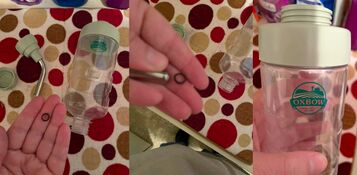
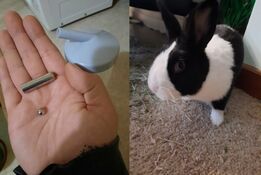
Increased drinking or alteration in food preference can be early signs of dental disease.[9]
How can I teach my rabbit to drink from a water bottle?
Some rabbits may not easily convert to using a water bottle if they are used to a bowl. It is a good skill to teach rabbits in the case of travel. A few techniques to try under supervision:
- Smearing a little bit of syrup or banana on the tip of the water bottle.
- Tap the end of the bottle to drip water while the rabbit is curious about the drinking spout.
- Place the water bottle above the water bowl.
Extra resources
- Kathy Smith, Bottled Water?
- The Rabbit House, Rabbit Water: Bottles & Bowls
Pellets
Pellets provide rabbits a convenient package of the necessary minerals and nutrients that are generally not available without a enormously varied diet. However, there are some rabbit owners who feed their rabbits a pellet-free diet due to teeth problems, chronic GI issues, and obesity. We recommend that you feed at most 1/8-1/4 cup of pellets per 5 lbs of rabbit per day. Too many pellets can lead to obesity and a lack of adequate hay consumption. See our Pellets article for more information on the type of pellets to choose.
Vegetables
Vegetables constitute an important part of your rabbit's diet and usually should be fed daily. Fresh vegetables should make up approximately 10% of your adult rabbit's diet. Vegetables provide additional nutrients and different textures and tastes, an enriching experience for your rabbit. Wet veggies are also a good source of water if your bunny does not drink very much from his water bowl or bottle. Read more at our Vegetables article.
In an emergency, a lack of vegetables in the diet will not harm your rabbit. However, do make sure that your rabbit still displays good appetite and is drinking enough water to make up for the decrease in hydration from vegetables.
Treats
While there are a variety of foods that you may feed your pet rabbit without severe digestion issues, we recommend using their regular pellets or fresh herbs and vegetables as treats. These foods will at least provide some nutrition to your rabbit, and typically rabbits will go crazy over anything that is not hay. Commercial brands with yogurt drops and other ingredients, while not necessarily immediately deadly to your bun, are not nutritious at all and may cause long term health problems if fed too often because of wrong flora developing in their gut. Fresh fruit and carrots are a better alternative if you really want to let your rabbit have a "piece of candy" and are also lighter on your wallet. Read more at our Treats article.
Special needs
Like humans, all rabbits are different, and some may not thrive on the standard rabbit diet recommended above. Some may not be able to tolerate greens while others may not be able to tolerate pellets. As their caretaker, you are the best judge of what is best for your rabbit and should adjust each portion of a bun's diet as needed. See Special needs rabbits for more information about their care.
Here are links with some more information about feeding a special needs rabbit.
- Kathy Smith, Feeding Rabbits with Special Needs
- Kathy Smith, Greens and Pellets: Finding the Right Balance
Further reading
- House Rabbit Society, FAQ: Diet
- Zooh Corner, Alexandra Logsdon, Rabbit Diet and Nutrition
- Dana Krempels, Ph.D, What Should I Feed my Bunny?
- Adopt-a-Rabbit.org, Cynthia K. Wheat, DVM, Feeding Rabbit for Optimal Health
- My House Rabbit, P.A. Smith, What to Feed Your House Rabbit
- Minnesota Companion Rabbit Society, Ann Barksdale, DVM, Balanced Diet for House Rabbits
- San Diego House Rabbit Society, Rabbit Food Pyramid
- Rabbit Welfare Association & Fund, Going Green – healthy eating for your rabbit
See also
When thinking about adult rabbit nutrition it is important to consider that (1) we want rabbits to chew continuously, either through hay (Timothy as a staple, but orchard and oat are great additions; don’t give alfalfa unless indicated by your vet) or grass; and (2) the majority of adult rabbits in our households are obese. For this reason, pellet (high quality and Timothy based) should be given in small quantities, typically 1 tablespoon a day for a 2kg rabbit is sufficient to integrate the micronutrients that could be missing in the diet. Also for this reason, and to prevent bloat, foods high in sugar content should not be given (carrots, bananas, etc). As a treat instead, I advise to give a couple of small berries a day (blueberries, raspberries and blackberries are all fine). Leafy greens, for rabbits that are used to them, are great, and an adult 2kg rabbit should eat about 6 cups of leafy greens a day. Make sure to provide a wide variety during the week, and limit those leafy greens that are high in calcium, such as chicory, kale or bok choy, especially in rabbits with urinary problems. - Dr. Di Girolamo Source.
References
- ↑ Moore, L. (2011). Rabbit Nutrition and Nutritional Healing. (1st ed.).
- ↑ Harriman, M. (2005). House Rabbit Handbook: How to Live with an Urban Rabbit. (4th ed.).
- ↑ House Rabbit Society. (2013). Rabbit Food. Retrieved 8 March, 2016, from http://rabbit.org/faq-diet/
- ↑ Buseth, M.E & Saunders, R. (2015). Rabbit Behaviour, Health and Care.
- ↑ Moore, L. (2011). Rabbit Nutrition and Nutritional Healing. (1st ed.).
- ↑ Krishona Martinson, PhD, and Marcia Hathaway, PhD, University of Minnesota, What is the vitamin content of grass hay?
- ↑ Rabbit Awareness Week, The Research
- ↑ Meredith, A & Redrobe, S. (2001). BSAVA Manual of Exotic Pets. (4th ed.).
- ↑ 9.0 9.1 9.2 9.3 Varga, M. (2013). Textbook of Rabbit Medicine. (2nd ed.).
- ↑ Harcourt-Brown, F. (2001). Textbook of Rabbit Medicine. (1st ed.).
- ↑ 11.0 11.1 Quesenberry, K & Carpenter, J. (2012). Ferrets, Rabbits, and Rodents: Clinical Medicine and Surgery. (3rd ed.).
- ↑ Ballard, B & Cheek, R. (2010). Exotic Animal Medicine for the Veterinary Technician . (2nd ed.).


